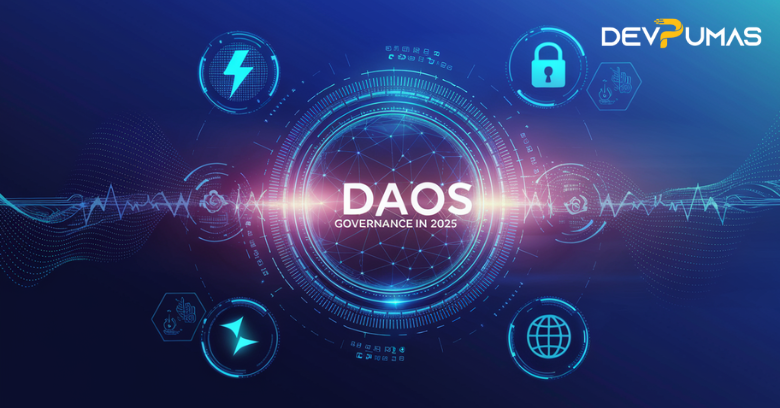Introduction: The Evolution of DAOs Governance in 2025
Decentralized Autonomous Organizations (DAOs) have emerged as a transformative force in digital governance. By leveraging blockchain technology and smart contracts, DAOs empower communities to make collective decisions without relying on traditional hierarchical structures. In DAOs governance in 2025, these organizations have advanced beyond their early experimental stages to become robust frameworks for managing decentralized ecosystems.
From decentralized finance (DeFi) platforms to NFT communities and even social initiatives, DAOs are redefining how groups collaborate and make decisions. This article explores how DAOs are evolving, their benefits and challenges, and their potential to reshape governance models across industries.
1. What are Decentralized Autonomous Organizations?
DAOs are blockchain-based organizations governed by smart contracts that execute decisions based on pre-programmed rules. Unlike traditional organizations with central leadership, DAOs operate on decentralized, community-driven principles.
Key Characteristics of DAOs:
- Decentralization: Power is distributed among token holders rather than centralized in a single entity.
- Autonomy: Smart contracts automate governance processes, reducing the need for intermediaries.
- Transparency: Blockchain ensures that all decisions and transactions are recorded immutably.
In DAOs governance in 2025, these principles are being refined to create more scalable, secure, and inclusive systems.
2. How DAOs Work: The Foundations of Decentralized Governance
The operational framework of DAOs includes:
2.1 Smart Contracts
These are self-executing contracts on the blockchain that encode organizational rules. They automate processes like voting and fund allocation.
2.2 Token-Based Voting
DAO members hold governance tokens, which they use to vote on proposals. The weight of each vote is often proportional to the number of tokens held.
2.3 Treasury Management
DAOs manage their funds collectively, often through multi-signature wallets, ensuring transparency and accountability.
3. Benefits of DAO Governance in 2025
3.1 Enhanced Transparency
Blockchain technology ensures that every decision is publicly recorded and auditable, building trust among members.
3.2 Inclusive Decision-Making
DAOs give voice to all stakeholders, enabling communities to shape their organizations democratically.
3.3 Global Collaboration
DAOs transcend geographical boundaries, allowing individuals from anywhere in the world to participate.
3.4 Efficiency Through Automation
By automating repetitive tasks, smart contracts reduce administrative overhead, enabling faster decision-making.
3.5 Alignment of Interests
Token-based incentives align the goals of members with the success of the DAO, fostering greater engagement.
4. Challenges Facing DAOs in 2025
Despite their potential, DAOs face several obstacles:
4.1 Voter Apathy
Low participation rates in governance voting can undermine the effectiveness of DAOs.
4.2 Scalability Issues
Managing a large number of proposals and participants can be challenging for DAOs with limited resources.
4.3 Security Risks
Smart contract vulnerabilities and hacks can jeopardize a DAO’s treasury and operations.
4.4 Regulatory Uncertainty
The lack of clear legal frameworks for DAOs creates challenges in compliance and liability.
4.5 Concentration of Power
Whales, or members holding a large number of tokens, can disproportionately influence decisions, leading to centralization.
5. Key Use Cases for DAOs in Digital Communities
5.1 Decentralized Finance (DeFi)
DAOs govern major DeFi protocols like Uniswap and MakerDAO, allowing users to vote on fee structures, upgrades, and treasury management.
5.2 NFT Projects
NFT communities use DAOs to manage royalties, fund creative projects, and make collective decisions about platform features.
5.3 Social Impact Initiatives
DAOs are emerging as vehicles for funding and managing social initiatives, such as disaster relief and community development.
5.4 Gaming Guilds
In play-to-earn gaming ecosystems, DAOs manage assets, distribute earnings, and govern game-related decisions.
5.5 Content Creation Platforms
DAOs enable creators to pool resources, govern platforms democratically, and distribute earnings equitably.
6. Technological Innovations Enhancing DAO Governance
6.1 Layer 2 Solutions
Layer 2 technologies like Polygon and Arbitrum improve scalability and reduce transaction costs, making DAOs more efficient.
6.2 Decentralized Identity (DID)
DID systems provide secure identity verification for DAO participants, enhancing trust and reducing fraud.
6.3 AI-Powered Governance Tools
AI algorithms analyze proposals, suggest optimizations, and predict outcomes to assist DAO members in making informed decisions.
6.4 Quadratic Voting
Quadratic voting addresses power imbalances by limiting the influence of large token holders, promoting fairer decision-making.
7. Regulatory Considerations for DAOs Governance in 2025
The regulatory landscape for DAOs is evolving, with governments and institutions exploring frameworks to address:
- Legal Recognition: Defining DAOs as legal entities.
- Taxation: Establishing tax policies for DAO treasuries and participants.
- Compliance: Ensuring DAOs adhere to anti-money laundering (AML) and know-your-customer (KYC) regulations.
Countries like Switzerland and Wyoming in the United States are leading the charge by offering legal structures for DAO registration.
8. Future Trends Shaping DAO Governance
8.1 Cross-Chain Governance
Interoperability solutions will enable DAOs to operate seamlessly across multiple blockchains, expanding their reach and functionality.
8.2 Dynamic Governance Models
Future DAOs will adopt flexible governance structures that evolve based on community needs and external conditions.
8.3 Integration with Traditional Organizations
Hybrid models will emerge, combining DAO principles with traditional corporate structures for enhanced collaboration.
8.4 Sustainability Initiatives
DAOs will play a pivotal role in funding and governing climate-focused projects, driving sustainable development.
Wrapping It Up: DAOs Governance in 2025
DAO governance in 2025 is set to redefine how communities and organizations collaborate, make decisions, and manage resources. By leveraging blockchain technology, DAOs offer transparency, inclusivity, and efficiency, making them a cornerstone of the decentralized future.
However, realizing their full potential requires addressing challenges like scalability, security, and regulatory compliance. As technological and legal frameworks evolve, DAOs are poised to transform governance across industries, from finance and gaming to social impact and beyond.



